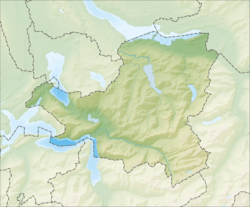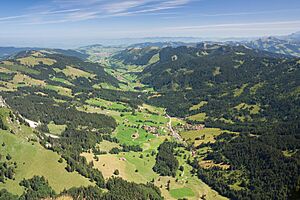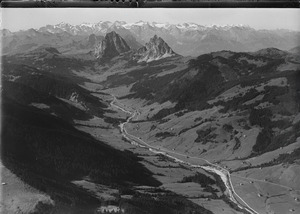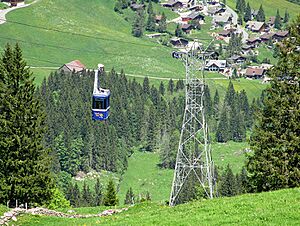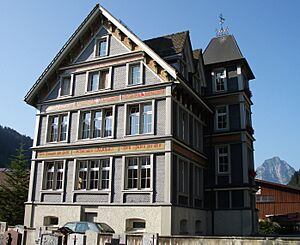Alpthal facts for kids
Quick facts for kids
Alpthal
|
||
|---|---|---|
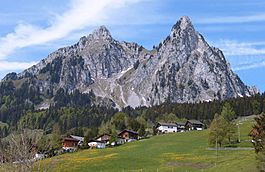 |
||
|
||
| Country | Switzerland | |
| Canton | Schwyz | |
| District | Schwyz | |
| Area | ||
| • Total | 22.88 km2 (8.83 sq mi) | |
| Elevation
(Kirche Alpthal)
|
996 m (3,268 ft) | |
| Population
(Dec 2020 )
|
||
| • Total | 613 | |
| • Density | 26.792/km2 (69.39/sq mi) | |
| Postal code |
8849
|
|
| Localities | Eigen, Alpthal, Brunni, Holzegg | |
| Surrounded by | Einsiedeln, Oberiberg, Rothenthurm, Schwyz | |
Alpthal is a small village and a municipality (like a town or district) in Switzerland. It is located in the Schwyz area. The municipality includes the main village of Alpthal. It also has the popular ski resort called Brunni and a smaller settlement named Eigen.
Contents
Alpthal's Past
Early Days
Alpthal was first written about way back in the year 1018. Back then, it was known as Albetal. A very old walking path, part of the Camino de Santiago pilgrimage route, passed through Alpthal. This path connected the towns of Einsiedeln and Schwyz.
Winter Fun Begins
Winter tourism started in Alpthal in 1950. This was when the first cable car opened. It connected Brunni to a place called Holzegg. Later, in 1964, Brunni got its first ski lift. The Brunni-Haggenegg ski area was fully ready for skiers in 1974.
Where is Alpthal?
Alpthal village is in the upper part of the Alptal valley. This valley is named after the Alp river. The popular ski resort of Brunni is about 3.3 kilometers (2.1 miles) further up the valley. The settlement of Eigen is about 2.1 kilometers (1.3 miles) down the valley.
Surrounding Nature
The Alp river flows past Eigen, then through the village of Trachslau. It continues to the town of Einsiedeln, which is about 7 kilometers (4.3 miles) away. Alpthal is surrounded by many mountain peaks. These include the Nüsellstock, Näbikenfirst, Grossbrechenstock, Kleiner Mythen, Grosser Mythen, Rotenfluh, Furggelenstock, and Gschwändstock.
Two mountain passes, the Haggenegg and the Holzegg, connect Alpthal towards Schwyz. The Mythen mountains and the Haggenegg pass are actually part of the Schwyz municipality.
Land Use
About 32.4% of Alpthal's land is used for farming. A large part, 62.8%, is covered by forests. Only a small part, 1.6%, has buildings or roads. The rest, 3.2%, is made up of rivers, glaciers, or mountains.
Getting Around Alpthal
The only road that leads into Alpthal comes from the town of Einsiedeln. This road follows the Alp river all the way to Brunni.
Hiking and Cable Cars
There are also hiking trails that cross the Haggenegg and the Holzegg. These trails lead to the town of Schwyz. You can only walk on them in the summer. A cable car also connects Brunni to the top of the Holzegg. This cable car runs in both summer and winter.
Bus and Train Connections
The PostBus Switzerland runs a bus service almost every hour. It goes from Einsiedeln railway station to Alpthal and Brunni. At Einsiedeln, you can connect to train services. These trains go to places like Wädenswil and Rapperswil, with more connections to Zürich.
People of Alpthal
Alpthal has a population of 613 people. About 4.9% of the people living here are from other countries. Over the last 10 years, the population has grown by 28%.
Languages Spoken
Most people in Alpthal, about 97.8%, speak German. Albanian is the second most common language, spoken by 1.8% of the population. Portuguese is the third most common, spoken by 0.4%.
Age and Gender
In Alpthal, about 52.4% of the people are male and 47.6% are female.
- About 28.8% of the population is under 20 years old.
- About 29.4% are between 20 and 39 years old.
- About 23.8% are between 40 and 64 years old.
- About 11.5% are between 65 and 74 years old.
- About 5.6% are between 70 and 79 years old.
- About 0.9% are over 80 years old.
Households
There are 172 households (homes) in Alpthal. About 32% of these homes have only one person living in them. About 8.7% are large households with five or more members.
Education and Jobs
About 59.5% of adults in Alpthal (aged 25–64) have finished high school or gone on to higher education. This could be a university or a specialized college.
Alpthal has a very low unemployment rate of 0.66%.
- About 48 people work in farming and related businesses. There are 21 such businesses.
- About 14 people work in manufacturing or construction. There are 5 businesses in this area.
- About 46 people work in services, like shops, hotels, or offices. There are 12 businesses in this area.
Religions
Most people in Alpthal are Roman Catholic, about 86.5%. About 7.6% belong to the Swiss Reformed Church. There are also people who are Islamic (1.8%). About 2.25% of the population do not belong to any church.
Population Changes Over Time
Here is how the population of Alpthal has changed over the years:
| year | population |
|---|---|
| 1850 | 390 |
| 1900 | 406 |
| 1950 | 312 |
| 1960 | 307 |
| 1970 | 325 |
| 1980 | 335 |
| 1990 | 369 |
| 2000 | 445 |
| 2005 | 511 |
| 2007 | 529 |
Alpthal's Weather
Alpthal gets a lot of rain, with an average of 161.9 rainy days each year. It receives about 2096 millimeters (82.5 inches) of rain per year. The wettest month is June, with about 249 millimeters (9.8 inches) of rain. It rains for about 16.2 days in June. The driest month is January, with about 129 millimeters (5.1 inches) of rain. It also rains for about 16.2 days in January.
See also
 In Spanish: Alpthal para niños
In Spanish: Alpthal para niños




